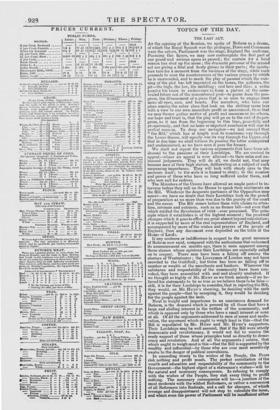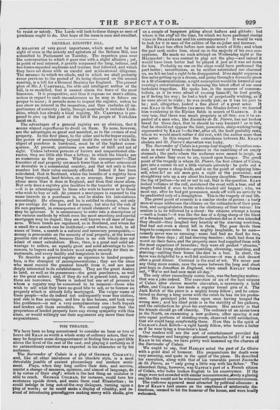. TOPICS OF THE DAY.
THE LAST ACT.
AT the opening of the Session, we .spoke of Refbrm as a drama, of which the Royal Speech was the prologue, Peers and Commons were the actors, Parliament was the stage, England the audience. Pursuing this figure, we may now contemplate the .first part of our grand and serious opera as passed ; the curtain for a brief season has shut up the scene ; the dramatis persona of the second act are giving a final and hasty glance to their parts ; the specta- tors turn for. a moment from the business of the stage, while each proceeds to scan the countenances of the various groups by which he is surrounded, and to mark. the play of passion whichthe cun- ning of the plot has left imprinted on the boxes, the galleries, the pit-the high, the low, the middling ; and here and there a critic puzzles his brain in endeavOura to form a picture of the unre- vealed future out of the remembered, past-to guess from the pro- gress, the denouement of a piece that is so soon to engage once more all eyes, ears, and hearts. For ourselves, who take our place amono•. the sober class that look on the shifting scene leas with a view to our own.immediate profit or. amusement, than that we may thence gather matter of profit and amusement for others, our hope and trust is, that the play will go on the end of its pro- gress, as it has from the beginning to this time, peacefully and prosperously, and that no lame or impotent conclusion will mar its perfect success. To drop our metaphor-we feel assured that " the Bill," which has at length won its wearisome way through the Lower House, will equally win its way through the Upper, arid that in due time we shall witness its passing the latter unimpaired and undiminished, as we have seen it pass the former.
We shall not repeat the various arguments that have been ad- dressed to the passions of their Lordships. We are content to appeal-where an appeal is ever allowed-to their calm and un- biassed judgments. They will do all, we doubt not, that may become men of their high station, deliberating on a subject of such surpassing importance. They will look with steady eyes to the measure itself; to the evils it is framed to abate; to the number and power of those who have so long suffered under them, and who now call for redress.
The Ministers of the Crown have allowed an ample period to in- tervene before they call on the House to speak their sentiments on the Bill. Whatever the desperate partisans of the Opposition may assert-we have no doubt that their Lordships look on the period of preparation as no more than was due to the gravity of the court and the cause. The Bill comes before them with claims to atten- tion, intrinsic and extrinsic, such as no former bill-not even that which ratified the Revolution of 1688-ever possessed. The prin- ciple which it establishes is of the highest moment ; the practical changes which it goes to effect are great almost beyond calculation; it is.supported by more of the real representation of England, and accompanied by more of the wishes and prayers of the people of England, than any document ever deposited on the table of the House of Loid3.
If any coolness or indifference in respect to the great measure of Reform now exist, compared with the enthusiasm that welcomed its announcement six months ago, there is none apparent among those classes whose opinions their Lordships are especially called on to respect. There may have been a falling off among the electors of Westminster; • the Liverymen of London may not have crowded to the Guildhall but there has been no falling off in number or wealth of the merchants and bankers. Wherever the substance and respectability of the community have been con-, yoked, they have . assembled with zeal and alacrity unabated. If we thought as highly of Mr. HUNT as we think meanly-if we be- lieved his statements to be as true as we believe them to be false=- still, it is for their.Lordships to consider, that in rejecting the Bill, they, would, on Mr. HUNT'S showing, be deciding with the mob against the people-that by accepting it, they would be deciding for the people, against the mob. Next in weight and importance to an unanimous demand for Reform, is the demand which is pressed by all those that. have a large and abiding interest in the welfare of the community, and which is opposed only by those who have a small interest or none at all. Of all the arguments addressed to men of sense and mode- ration, the argument which ought to weigh least is this-that the Bill is repudiated by Mr. HUNT and Mr. Humes supporters. Their Lordships may be well assured, that if the Bill were utterly democratic and revolutionary, it would not fail to receive the ready support of those whose principles tend so directly to demo- cracy and revolution. And of all the arguments a contra, that which ought to weigh most is this -that the Bill is supported by the wealthy and influential-by those who are ever most sensitively awake to the danger of political convulsions. In conceding wisely to the wishes of the People, the .Peers risk nothing and profit much. The perfect conciliation of the wealth and education and respectability-of the community to the Government-the highest object of a statesman's wishes-will be the natural and necessary consequence. In refusing to comply with the wishes of the People, they risk every thing to profit nothing. The necessary consequence will be-a junction of the most moderate with the wildest ReforMers, or rather a conversion of all Reformers into Radicals, and a call for changes, of which revenge and disappointment will not stop to calculate the issue, and which even the power of Parliament will be insufficient either to resist or satisfy. The Lords will look to these things as men of prudence ought to do. Our hope of the issue is sure and steadfast.



























 Previous page
Previous page